2025
Learn more about “From Manners to Rules”
By Celeste Arrington (Cambridge University Press, 2025).
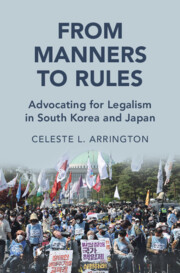
Summary:
From Manners to Rules traces the emergence of legalistic governance in South Korea and Japan. While these countries were previously known for governance characterized by bureaucratic discretion and vague laws, activists and lawyers are pushing for a more legalistic regulatory style. Legalism involves more formal, detailed, and enforceable rules and participatory policy processes. Previous studies have focused on top-down or structural explanations for legalism. From Manners to Rules instead documents bottom-up sources of institutional and social change, as activists and lawyers advocate for and use more formal rules and procedures. By comparing recent reforms in disability rights and tobacco control, the book uncovers the societal drivers behind legalism and the broader judicialization of politics in East Asia’s main democracies. Drawing on 120 interviews and diverse sources, From Manners to Rules challenges the conventional wisdom that law and courts play marginal roles in Korean and Japanese politics and illuminates how legalistic governance is transforming citizens’ options for political participation.
Learn more about “Rebranding North Korea”
By Immanuel Kim (University of Hawaii Press, 2025).

Summary:
“Everything for the people, everything according to the people!” —Kim Jong Un
Under Kim Jong Un, North Korea has undertaken significant efforts to elevate the standard of living for its citizens. This shift has led to notable advancements in production and the quality of visual media, teaching North Koreans the “language” of consumerism and new methods of consumption. In Rebranding North Korea, Immanuel Kim delves into the implications of a thoroughly modernized North Korea for its citizens and the world as the country strives to participate in global modernity and technological advancements.
Kim traces two parallel trajectories illustrating the most significant changes in North Korean consumer culture: the expansion of modern urban development projects and increased social amenities, alongside the technologically advanced aesthetic qualities of visual media. These changes reveal the transition from the politics-centric society of the Kim Jong Il regime to the consumer-centric one under Kim Jong Un. The country’s revamping of visual culture—as seen in the move from celluloid to digital formats, improved filmmaking techniques, advanced editing, drone usage, and artistic photographic renditions, coupled with an emphasis on digital literacy—highlights North Korea’s attempts to educate itself and rebrand the DPRK. Its revamped cityscapes, gentrified living conditions, fashionable consumer goods, and transformed film and television industries signal a strong and stable economy where citizens are not just getting by but actively customizing their consumerist lifestyles according to the images portrayed in visual media.
2021
Learn more about “Rights Claiming in South Korea”
Edited by Celeste Arrington and Patricia Goedde (Cambridge University Press, 2021).
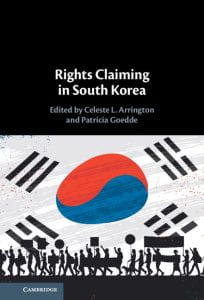
Summary:
Although rights-based claims are diversifying and opportunities and resources for claims-making have improved, obtaining rights protections and catalysing social change in South Korea remain challenging processes. This volume examines how different groups in South Korea have defined and articulated grievances and mobilized to remedy them. It explores developments in the institutional contexts within which rights claiming occurs and in the sources of support available for utilizing different claims-making channels. Drawing on scores of original interviews, readings of court rulings and statutes, primary archival and digital sources, and interpretive analysis of news media coverage in Korean, this volume illuminates rights in action. The chapters uncover conflicts over contending rights claims, expose disparities between theory and practice in the law, trace interconnections among rights-based movements, and map emerging trends in the use of rights language. Case studies examine the rights of women, workers, people with disabilities, migrants, and sexual minorities.
Learn more about “Nobody’s Normal: How Culture Created the Stigma of Mental Illness”
Roy Richard Grinker (W.W. Norton, January 2021).
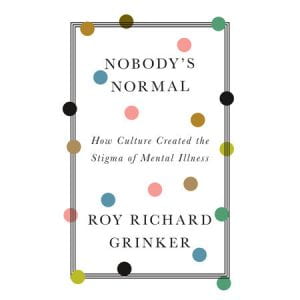
Summary:
For centuries, scientists and society cast moral judgments on anyone deemed mentally ill, confining many to asylums. In Nobody’s Normal, anthropologist Roy Richard Grinker chronicles the progress and setbacks in the struggle against mental-illness stigma―from the eighteenth century, through America’s major wars, and into today’s high-tech economy.
Nobody’s Normal argues that stigma is a social process that can be explained through cultural history, a process that began the moment we defined mental illness, that we learn from within our communities, and that we ultimately have the power to change. Though the legacies of shame and secrecy are still with us today, Grinker writes that we are at the cusp of ending the marginalization of the mentally ill. In the twenty-first century, mental illnesses are fast becoming a more accepted and visible part of human diversity.
Learn more about “Rights Claiming in South Korea”
Edited by Celeste Arrington and Patricia Goedde (Cambridge University Press, 2021).

Summary:
Although rights-based claims are diversifying and opportunities and resources for claims-making have improved, obtaining rights protections and catalysing social change in South Korea remain challenging processes. This volume examines how different groups in South Korea have defined and articulated grievances and mobilized to remedy them. It explores developments in the institutional contexts within which rights claiming occurs and in the sources of support available for utilizing different claims-making channels. Drawing on scores of original interviews, readings of court rulings and statutes, primary archival and digital sources, and interpretive analysis of news media coverage in Korean, this volume illuminates rights in action. The chapters uncover conflicts over contending rights claims, expose disparities between theory and practice in the law, trace interconnections among rights-based movements, and map emerging trends in the use of rights language. Case studies examine the rights of women, workers, people with disabilities, migrants, and sexual minorities.
Learn more about “Nobody’s Normal: How Culture Created the Stigma of Mental Illness”
Roy Richard Grinker (W.W. Norton, January 2021).

Summary:
For centuries, scientists and society cast moral judgments on anyone deemed mentally ill, confining many to asylums. In Nobody’s Normal, anthropologist Roy Richard Grinker chronicles the progress and setbacks in the struggle against mental-illness stigma―from the eighteenth century, through America’s major wars, and into today’s high-tech economy.
Nobody’s Normal argues that stigma is a social process that can be explained through cultural history, a process that began the moment we defined mental illness, that we learn from within our communities, and that we ultimately have the power to change. Though the legacies of shame and secrecy are still with us today, Grinker writes that we are at the cusp of ending the marginalization of the mentally ill. In the twenty-first century, mental illnesses are fast becoming a more accepted and visible part of human diversity.
Learn more about “Rights Claiming in South Korea”
Edited by Celeste Arrington and Patricia Goedde (Cambridge University Press, 2021).

Summary:
Although rights-based claims are diversifying and opportunities and resources for claims-making have improved, obtaining rights protections and catalysing social change in South Korea remain challenging processes. This volume examines how different groups in South Korea have defined and articulated grievances and mobilized to remedy them. It explores developments in the institutional contexts within which rights claiming occurs and in the sources of support available for utilizing different claims-making channels. Drawing on scores of original interviews, readings of court rulings and statutes, primary archival and digital sources, and interpretive analysis of news media coverage in Korean, this volume illuminates rights in action. The chapters uncover conflicts over contending rights claims, expose disparities between theory and practice in the law, trace interconnections among rights-based movements, and map emerging trends in the use of rights language. Case studies examine the rights of women, workers, people with disabilities, migrants, and sexual minorities.
Learn more about “Nobody’s Normal: How Culture Created the Stigma of Mental Illness”
Roy Richard Grinker (W.W. Norton, January 2021).

Summary:
For centuries, scientists and society cast moral judgments on anyone deemed mentally ill, confining many to asylums. In Nobody’s Normal, anthropologist Roy Richard Grinker chronicles the progress and setbacks in the struggle against mental-illness stigma―from the eighteenth century, through America’s major wars, and into today’s high-tech economy.
Nobody’s Normal argues that stigma is a social process that can be explained through cultural history, a process that began the moment we defined mental illness, that we learn from within our communities, and that we ultimately have the power to change. Though the legacies of shame and secrecy are still with us today, Grinker writes that we are at the cusp of ending the marginalization of the mentally ill. In the twenty-first century, mental illnesses are fast becoming a more accepted and visible part of human diversity.
Learn more about “Rights Claiming in South Korea”
Edited by Celeste Arrington and Patricia Goedde (Cambridge University Press, 2021).

Summary:
Although rights-based claims are diversifying and opportunities and resources for claims-making have improved, obtaining rights protections and catalysing social change in South Korea remain challenging processes. This volume examines how different groups in South Korea have defined and articulated grievances and mobilized to remedy them. It explores developments in the institutional contexts within which rights claiming occurs and in the sources of support available for utilizing different claims-making channels. Drawing on scores of original interviews, readings of court rulings and statutes, primary archival and digital sources, and interpretive analysis of news media coverage in Korean, this volume illuminates rights in action. The chapters uncover conflicts over contending rights claims, expose disparities between theory and practice in the law, trace interconnections among rights-based movements, and map emerging trends in the use of rights language. Case studies examine the rights of women, workers, people with disabilities, migrants, and sexual minorities.
Learn more about “Nobody’s Normal: How Culture Created the Stigma of Mental Illness”
Roy Richard Grinker (W.W. Norton, January 2021).

Summary:
For centuries, scientists and society cast moral judgments on anyone deemed mentally ill, confining many to asylums. In Nobody’s Normal, anthropologist Roy Richard Grinker chronicles the progress and setbacks in the struggle against mental-illness stigma―from the eighteenth century, through America’s major wars, and into today’s high-tech economy.
Nobody’s Normal argues that stigma is a social process that can be explained through cultural history, a process that began the moment we defined mental illness, that we learn from within our communities, and that we ultimately have the power to change. Though the legacies of shame and secrecy are still with us today, Grinker writes that we are at the cusp of ending the marginalization of the mentally ill. In the twenty-first century, mental illnesses are fast becoming a more accepted and visible part of human diversity.
Learn more about “Rights Claiming in South Korea”
Edited by Celeste Arrington and Patricia Goedde (Cambridge University Press, 2021).

Summary:
Although rights-based claims are diversifying and opportunities and resources for claims-making have improved, obtaining rights protections and catalysing social change in South Korea remain challenging processes. This volume examines how different groups in South Korea have defined and articulated grievances and mobilized to remedy them. It explores developments in the institutional contexts within which rights claiming occurs and in the sources of support available for utilizing different claims-making channels. Drawing on scores of original interviews, readings of court rulings and statutes, primary archival and digital sources, and interpretive analysis of news media coverage in Korean, this volume illuminates rights in action. The chapters uncover conflicts over contending rights claims, expose disparities between theory and practice in the law, trace interconnections among rights-based movements, and map emerging trends in the use of rights language. Case studies examine the rights of women, workers, people with disabilities, migrants, and sexual minorities.
Learn more about “Nobody’s Normal: How Culture Created the Stigma of Mental Illness”
Roy Richard Grinker (W.W. Norton, January 2021).

Summary:
For centuries, scientists and society cast moral judgments on anyone deemed mentally ill, confining many to asylums. In Nobody’s Normal, anthropologist Roy Richard Grinker chronicles the progress and setbacks in the struggle against mental-illness stigma―from the eighteenth century, through America’s major wars, and into today’s high-tech economy.
Nobody’s Normal argues that stigma is a social process that can be explained through cultural history, a process that began the moment we defined mental illness, that we learn from within our communities, and that we ultimately have the power to change. Though the legacies of shame and secrecy are still with us today, Grinker writes that we are at the cusp of ending the marginalization of the mentally ill. In the twenty-first century, mental illnesses are fast becoming a more accepted and visible part of human diversity.
2020
Learn more about “Friend: A Novel From North Korea”
Paek Nam-nyong (author), Immanuel Kim (translator) (Columbia University Press, 2020)

Summary:
Paek Nam-nyong’s Friend is a tale of marital intrigue, abuse, and divorce in North Korea. A woman in her thirties comes to a courthouse petitioning for a divorce. As the judge who hears her statement begins to investigate the case, the story unfolds into a broader consideration of love and marriage. The novel delves into its protagonists’ past, describing how the couple first fell in love and then how their marriage deteriorated over the years. It chronicles the toll their acrimony takes on their son and their careers alongside the story of the judge’s own marital troubles.
Learn more about “Power Up! Korean Vocabulary”
Insung Ko and Sang-Seok Yoon (Korea University Press, June 2015)
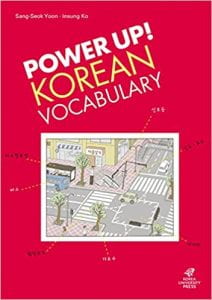
Summary:
Power Up Korean Vocabulary is full of essential information that beginning to intermediate level students must know. This book kindly points out important lexical, grammatical, and cultural information of the words along with helpful warnings against common mistakes by Korean learners. Students are expected to expand their vocabulary easily and in an interesting way while practicing 25 lessons.
Learn more about “Laughing North Koreans: The Culture of Comedy Films”
Immanuel Kim (Lexington Books, 2020)
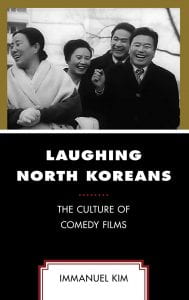
Summary:
This study analyzes North Korean comedy films from the late 1960s to present day. It examines the most iconic comedy films and comedians to show how North Koreans have enjoyed themselves and have established a culture of humor that challenges, subverts, and, at times, reinforces the dominant political ideology. The author argues that comedy films, popular comedians, and the viewers have an intricate interdependent relationship that shaped the film culture—the pre/post production of filmmaking, film-watching experience, and the legacies of actors—in North Korea.
2019
Learn more about “Korea and the World: New Frontiers in Korean Studies”
Gregg Brazinsky (Lexington Books, 2019)
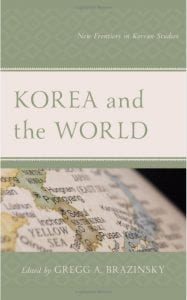
Summary:
This edited volume brings together a set of essays exploring the global dimensions of Korea’s recent history and politics by a group of the most talented young scholars. Essays in the volume seek to answer two interrelated questions: How have international developments impacted Korea? And how has Korea in turn influenced world events and trends? The volume demonstrates that the most important issues in Korea’s post World War II history—division, war, economic development, and inter-Korean rivalry—cannot be understood without reference to the country’s global interactions. Essays in the volume cover a range of topics including: U.S.-South Korean relations, North Korean foreign policy, immigration, and democratization. By bringing new voices in Korean Studies to the forefront, this volume changes how we understand and reconceptualize Korea’s role in the world.
2018
Learn more about out “Rewriting Revolution: Women, Sexuality, and Memory in North Korean Fictiony”
Immanuel Kim (University of Hawai’i Press, 2018)
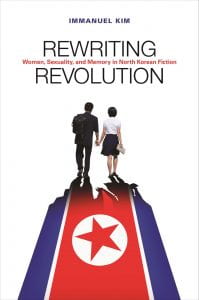
Summary:
North Korea, the Democratic People’s Republic of Korea (DPRK), is firmly fixed in the Western imagination as a barbaric vestige of the Cold War, a “rogue” nation that refuses to abide by international norms. It is seen as belligerent and oppressive, a poor nation bent on depriving its citizens of their basic human rights and expanding its nuclear weapons program at the expense of a faltering economy. Even the North’s literary output is stigmatized and dismissed as mere propaganda literature praising the Great Leader.
Learn more about “The Routledge Course in Business Korean”
Young-Key Kim-Renaud, Miok Pak (Routledge, 2018)
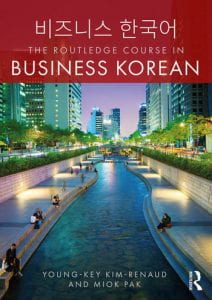
Summary:
The Routledge Course in Business Korean is a textbook for teaching Korean to mid-intermediate to low-advanced students to learn the language used in a business context in every-day life in Korea. The authors’ intuitive approach makes it easy for students to follow the units, while the relevant and practical learning objectives benefit both student and teacher alike.
The book introduces the vocabulary and key phrases of business Korean and focuses on delivering real business-related situations, authentic expressions, and linguistically and culturally rich introductions and explanations of Korean business life. Audio files can be found on the accompanying e-Resource.
2017
Learn more about “Winning the Third World: Sino-American Rivalry During the Cold War”
Gregg Brazinsky (The University of North Carolina Press, 2017)
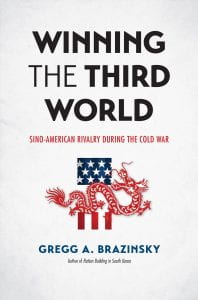
Summary:
Winning the Third World examines afresh the intense and enduring rivalry between the United States and China during the Cold War. Gregg A. Brazinsky shows how both nations fought vigorously to establish their influence in newly independent African and Asian countries. By playing a leadership role in Asia and Africa, China hoped to regain its status in world affairs, but Americans feared that China’s history as a nonwhite, anticolonial nation would make it an even more dangerous threat in the postcolonial world than the Soviet Union. Drawing on a broad array of new archival materials from China and the United States, Brazinsky demonstrates that disrupting China’s efforts to elevate its stature became an important motive behind Washington’s use of both hard and soft power in the “Global South.”
2016
Learn more about “The Emotions of Justice: Gender, Status, and Legal Performance in Chŏson Korea”
Jisoo Kim (University of Washington Press, originally published in 2015)
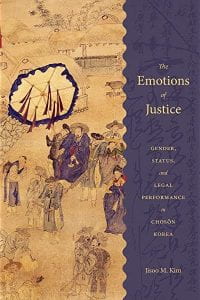
Summary:
The Choson state (1392–1910) is typically portrayed as a rigid society because of its hereditary status system, slavery, and Confucian gender norms. However, The Emotions of Justice reveals a surprisingly complex picture of a judicial system that operated in a contradictory fashion by discriminating against subjects while simultaneously minimizing such discrimination. Jisoo Kim contends that the state’s recognition of won, or the sense of being wronged, permitted subjects of different genders or statuses to interact in the legal realm and in doing so illuminates the intersection of law, emotions, and gender in premodern Korea.
Celeste Arrington (Cornell University Press, 2016)
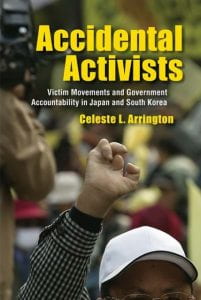
Summary:
Government wrongdoing or negligence harms people worldwide, but not all victims are equally effective at obtaining redress. In Accidental Activists, Celeste L. Arrington examines the interactive dynamics of the politics of redress to understand why not. Relatively powerless groups like redress claimants depend on support from political elites, active groups in society, the media, experts, lawyers, and the interested public to capture democratic policymakers’ attention and sway their decisions. Focusing on when and how such third-party support matters, Arrington finds that elite allies may raise awareness about the victims’ cause or sponsor special legislation, but their activities also tend to deter the mobilization of fellow claimants and public sympathy. By contrast, claimants who gain elite allies only after the difficult and potentially risky process of mobilizing societal support tend to achieve more redress, which can include official inquiries, apologies, compensation, and structural reforms.
Learn more about “워싱턴문학 Wŏshingt’ŏn Munhak (Korean Literature of Washington)”
Young-Key Kim-Renaud [Editor], 워싱턴문학 Wŏshingt’ŏn Munhak (Korean Literature of Washington) 19 (405 pages). The Korean Literary Society of Washington, Seoul: Wŏrin Publishing Company.
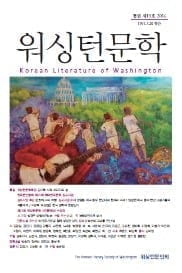
2010
Learn more about “Perspectives on Africa: A Reader in Culture, History, and Representation”
Roy Richard Grinker (co-editor) (Wiley-Blackwell, 2010)
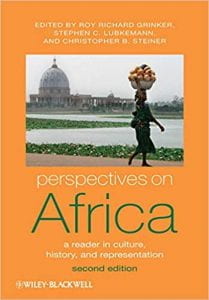
Summary:
The second edition of Perspectives on Africa: A Reader in Culture, History, and Representation is both an introduction to the cultures of Africa and a history of the interpretations of those cultures. Key essays explore the major issues and debates through a combination of classic articles and the newest research in the field.
2009
Learn more about “Korean: An Essential Grammar”
Young-Key Kim-Renaud (Routledge, 2009)
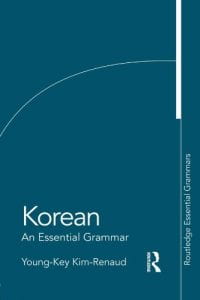
Summary:
Korean: An Essential Grammar is a concise and convenient guide to the basic grammatical structure of standard Korean. Presenting a fresh and accessible description of the language, this engaging Grammar uses clear, jargon-free explanations and sets out the complexities of Korean in short, readable sections.
2007
Learn more about “Nation Building in South Korea: Koreans, Americans, and the Making of a Democracy”
Gregg Brazinsky (The University of North Carolina Press, 2007)
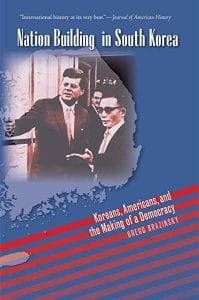
Summary:
In this ambitious and innovative study Gregg Brazinsky examines American nation building in South Korea during the Cold War. Marshaling a vast array of new American and Korean sources, he explains why South Korea was one of the few postcolonial nations that achieved rapid economic development and democratization by the end of the twentieth century. Brazinsky contends that a distinctive combination of American initiatives and Korean agency enabled South Korea’s stunning transformation. On one hand, Americans supported the emergence of a developmental autocracy that spurred economic growth in a highly authoritarian manner. On the other hand, Americans sought to encourage democratization from the bottom up by fashioning new institutions and promoting a dialogue about modernization and development.
Learn more about “Unstrange Minds: Remapping the World of Autism”
Roy Richard Grinker (Basic Books, 2007)
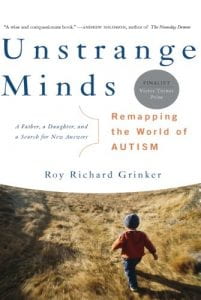
Summary:
When Isabel Grinker was diagnosed with autism in 1994, it occurred in only about 3 of every 10,000 children. Within ten years, rates had skyrocketed. Some scientists reported rates as high as 1 in 150. The media had declared autism an epidemic.
Unstrange Minds documents the global quest of Isabel’s father, renowned anthropologist Roy Richard Grinker, to discover the surprising truth about why autism is so much more common today. In fact, there is no autism epidemic. Rather, we are experiencing an increase in autism diagnoses, and Grinker shows that the identification and treatment of autism depends on culture just as much as it does on science. Filled with moving stories and informed by the latest science, Unstrange Minds is a powerful testament to a father’s search for the truth.
2006
Learn more about “And So Flows History”
Hahn Moo-sook (author), Young-Key Kim-Renaud (translator) (University of Hawai’i Press, originally published in 2005)
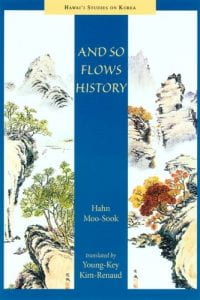
Summary:
A deeply compelling saga of love, jealously, honor, and greed, And So Flows History (Yôksanûn hûrûnda, 1947) depicts the relentless power of exterior forces on the individual lives of three generations of the illustrious Cho family—from the waning years of the Choson dynasty in the late nineteenth century to the tumultuous postliberation era.
Learn more about “Plentiful Absence II: A Commemorative Volume for Paeknong Jin-Heung Kim”
Edited by Young-Key Kim-Renaud and Hoagy Kim (Salmgwa Kkum [Life and Dream] Publishing Co, 2006)
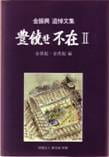
Summary:
A tribute volume to celebrate the life and art of Jin-Heung Kim (1916-2005), with a pen-name of Paengnong. The humble me of the Paektong branch of the Kangnung-Kim clan. A financier who has made a major contribution to Korean banking as the longest tenured bank president in the ROK history, Kim was an amateur calligrapher and painter. Husband of the late Hahn Moo-Sook, a famous Korean novelist and member of the ROK Academy of Arts and Letters, he devoted his dozen years of solitude after her death to promote Korean art and culture in her honor. This commemorative volume, edited by Kim’s first daughter, Young-Key Kim-Renaud, and his first son, Hoagy Kim, consists of three parts. The first contains 27 tribute essays by friends and distinguished figures in and beyond Korea, and the second part includes 13 remembrances by extended family members living in and outside Korea. The third part is a collection of Jin-Heung Kim’s own published essays, reflections, and newspaper interviews, and unpublished letters with some dozen more essays, letters and remarks that his friends and family members dedicated to him while he was living.
2003
Learn more about out “Creative Women of Korea: The Fifteenth through the Twentieth Centuries”
Edited by Young-Key Kim-Renaud (Routledge, originally published in 2003)
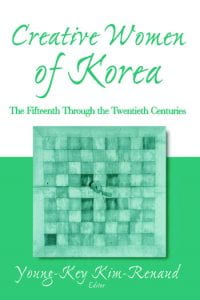
Summary:
This book introduces important contributions in the humanities by a select group of traditional and modern Korean women, from the 15th through the 20th centuries. The literary and artistic works of these women are considered Korean classics, and the featured artists and writers range from a queen, to a courtesan, to a Buddhist nun, to unkown women of Korea.
2000
Learn more about out “In the Arms of Africa: The Life of Colin M. Turnbull”
Roy Richard Grinker (The University of Chicago Press, 2000)

Summary:
Colin Turnbull made a name for himself with The Forest People, his acclaimed study of African Pygmies. His second book, however, The Mountain People, ignited a swirl of controversy within anthropology and tainted Turnbull’s reputation as a respected anthropologist.
In this scrupulously researched biography, Roy Richard Grinker charts the rise and fall of this colorful and controversial man—from his Scottish family and British education to travels in Africa and his great love affair with Joe Towles. Grinker, noted for his own work on the Pygmies, herein gives readers a fascinating account of Turnbull’s life and work.
1998
Learn more about out “Korea and Its Futures: Unification and the Unfinished War”
Roy Richard Grinker (St. Martin’s Press, originally published in 1998)
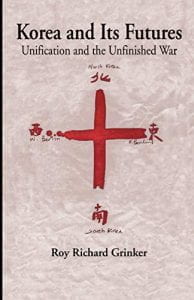
Summary:
Despite the passage of over forty years since the official end of the civil war in Korea, the north and the south sections of the country remain technically at war. In Korea and Its Futures, Roy Richard Grinker argues that the continued conflict between North and South Korea, and the prospects for peace on the Korean peninsula, must be understood within the broader social and cultural contexts in which Koreans live. Grinker suggests that a fundamental obstacle to peace on the peninsula is that South Korea has become a nation in which nearly all aspects of economic, political, and cultural identity are defined in opposition to North Korea. He further demonstrates that in spite of its status as a sacred goal for all Koreans, the idea of unification threatens the world in which almost every South Korean has been born and raised. In chapters on defectors, divided families, student protests, and early education, Grinker reveals how South Korean conceptions of unification prevent either side from recognizing that a unified Korea must also be a diverse Korea.
1997
Learn more about out “The Korean Alphabet: Its History and Structure”
Edited by Young-Key Kim-Renaud (University of Hawai’i Press, 1997)
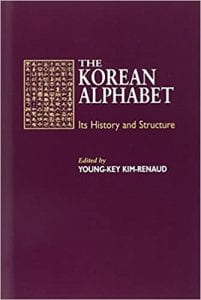
Summary:
A collection of ten essays which cover topics such as: arguments for King Sejong’s personal creation of the script; the Asian and domestic linguistic and socio-cultural background to its creation; the principles under which each symbol was created; and the structure of phonological units.
Learn more about out “King Sejong the Great: The Light of Fifteenth Century Korea”
Young-Key Kim-Renaud (International Circle of Korean Linguistics, 1997)
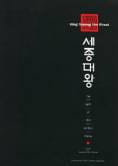
Summary:
This book is about Korea’s golden age and its cultural hero, King Sejong (r. 1418-1450), inventor of the Korean alphabet. The ultimate example of an enlightened ruler in the East-Asian tradition, Sejong combined deep compassion for his people with high intelligence and an aesthetic sense.
He was personally engaged in an amazing range of projects, from agriculture, calendrical mathematics, geography, medicine, law and printing to history, literature, music, and the Confucian classics, publishing a number of important works in a wide variety of fields.
1995
Learn more about out “Korean Consonantal Phonology”
Young-Key Kim-Renaud (Hanshin Publishing Company, 1995)
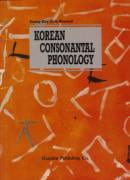
Summary:
This book is an attempt to present, exemplify and justify a particular analysis of a portion of Korean phonology involving consonantal alternations including those in the so-called girregular h verbs, the neutralization of obstruents, h becoming a coronal stop, and consonant cluster simplifications and fortition phenomena, as well as assimilation phenomena such as palatalization, nasalization, lateralization and various place assimilation. Assumptions about a set of boundaries used in this work and a summary of rule ordering relations are presented as appendixes.
1994
Learn more about out “Theoretical Issues in Korean Linguistics”
Edited by Young-Key Kim-Renaud (The University of Chicago Press, 1994)
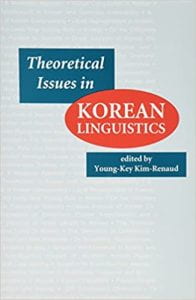
Summary:
This volume contains a collection of articles reflecting the dynamic and lively state of Korean linguistics today. Areas represented include theoretical phonology and syntax, semantics, historical linguistics, discourse/pragmatics, and first language acquisition. The papers were chosen from those presented at the Eighth International Conference on Korean Linguistics.
Roy Richard Grinker (University of California Press, 1994)
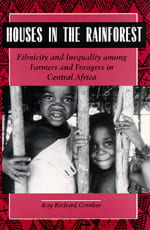
Summary:
This is the first ethnographic study of the farmers and foragers of northeastern Zaire since Colin Turnbull’s classic works of the 1960s. Roy Richard Grinker lived for nearly two years among the Lese farmers and their long-term partners, the Efe (Pygmies), learned their languages, and gained unique insights into their complex social relations and ethnic identities. By showing how political organization is structured by ethnic and gender relations in the Lese house, Grinker challenges previous views of the Lese and Efe and other farmer-forager societies, as well as the conventional anthropological boundary between domestic and political contexts.
1986
Learn more about out “Studies in Korean Linguistics”
Young-Key Kim-Renaud (Hanshin Publishing Company, 1986)

Summary:
This book is a collection of linguistic articles on theoretical aspects in Korean phonology, sociolinguistics, and syntax which also includes a section that deals with areas of an applied nature, such as issues in translation and language teaching. It is followed by the author’s interview with Noam Chomsky carried out in 1978.
2021
Learn more about “Rights Claiming in South Korea”
Edited by Celeste Arrington and Patricia Goedde (Cambridge University Press, 2021).

Summary:
Although rights-based claims are diversifying and opportunities and resources for claims-making have improved, obtaining rights protections and catalysing social change in South Korea remain challenging processes. This volume examines how different groups in South Korea have defined and articulated grievances and mobilized to remedy them. It explores developments in the institutional contexts within which rights claiming occurs and in the sources of support available for utilizing different claims-making channels. Drawing on scores of original interviews, readings of court rulings and statutes, primary archival and digital sources, and interpretive analysis of news media coverage in Korean, this volume illuminates rights in action. The chapters uncover conflicts over contending rights claims, expose disparities between theory and practice in the law, trace interconnections among rights-based movements, and map emerging trends in the use of rights language. Case studies examine the rights of women, workers, people with disabilities, migrants, and sexual minorities.
Learn more about “Nobody’s Normal: How Culture Created the Stigma of Mental Illness”
Roy Richard Grinker (W.W. Norton, January 2021).

Summary:
For centuries, scientists and society cast moral judgments on anyone deemed mentally ill, confining many to asylums. In Nobody’s Normal, anthropologist Roy Richard Grinker chronicles the progress and setbacks in the struggle against mental-illness stigma―from the eighteenth century, through America’s major wars, and into today’s high-tech economy.
Nobody’s Normal argues that stigma is a social process that can be explained through cultural history, a process that began the moment we defined mental illness, that we learn from within our communities, and that we ultimately have the power to change. Though the legacies of shame and secrecy are still with us today, Grinker writes that we are at the cusp of ending the marginalization of the mentally ill. In the twenty-first century, mental illnesses are fast becoming a more accepted and visible part of human diversity.
2020
Learn more about “Friend: A Novel From North Korea”
Paek Nam-nyong (author), Immanuel Kim (translator) (Columbia University Press, 2020)

Summary:
Paek Nam-nyong’s Friend is a tale of marital intrigue, abuse, and divorce in North Korea. A woman in her thirties comes to a courthouse petitioning for a divorce. As the judge who hears her statement begins to investigate the case, the story unfolds into a broader consideration of love and marriage. The novel delves into its protagonists’ past, describing how the couple first fell in love and then how their marriage deteriorated over the years. It chronicles the toll their acrimony takes on their son and their careers alongside the story of the judge’s own marital troubles.
Learn more about “Power Up! Korean Vocabulary”
Insung Ko and Sang-Seok Yoon (Korea University Press, June 2015)

Summary:
Power Up Korean Vocabulary is full of essential information that beginning to intermediate level students must know. This book kindly points out important lexical, grammatical, and cultural information of the words along with helpful warnings against common mistakes by Korean learners. Students are expected to expand their vocabulary easily and in an interesting way while practicing 25 lessons.
Learn more about “Laughing North Koreans: The Culture of Comedy Films”
Immanuel Kim (Lexington Books, 2020)

Summary:
This study analyzes North Korean comedy films from the late 1960s to present day. It examines the most iconic comedy films and comedians to show how North Koreans have enjoyed themselves and have established a culture of humor that challenges, subverts, and, at times, reinforces the dominant political ideology. The author argues that comedy films, popular comedians, and the viewers have an intricate interdependent relationship that shaped the film culture—the pre/post production of filmmaking, film-watching experience, and the legacies of actors—in North Korea.
2019
Learn more about “Korea and the World: New Frontiers in Korean Studies”
Gregg Brazinsky (Lexington Books, 2019)

Summary:
This edited volume brings together a set of essays exploring the global dimensions of Korea’s recent history and politics by a group of the most talented young scholars. Essays in the volume seek to answer two interrelated questions: How have international developments impacted Korea? And how has Korea in turn influenced world events and trends? The volume demonstrates that the most important issues in Korea’s post World War II history—division, war, economic development, and inter-Korean rivalry—cannot be understood without reference to the country’s global interactions. Essays in the volume cover a range of topics including: U.S.-South Korean relations, North Korean foreign policy, immigration, and democratization. By bringing new voices in Korean Studies to the forefront, this volume changes how we understand and reconceptualize Korea’s role in the world.
2018
Learn more about out “Rewriting Revolution: Women, Sexuality, and Memory in North Korean Fictiony”
Immanuel Kim (University of Hawai’i Press, 2018)

Summary:
North Korea, the Democratic People’s Republic of Korea (DPRK), is firmly fixed in the Western imagination as a barbaric vestige of the Cold War, a “rogue” nation that refuses to abide by international norms. It is seen as belligerent and oppressive, a poor nation bent on depriving its citizens of their basic human rights and expanding its nuclear weapons program at the expense of a faltering economy. Even the North’s literary output is stigmatized and dismissed as mere propaganda literature praising the Great Leader.
Learn more about “The Routledge Course in Business Korean”
Young-Key Kim-Renaud, Miok Pak (Routledge, 2018)

Summary:
The Routledge Course in Business Korean is a textbook for teaching Korean to mid-intermediate to low-advanced students to learn the language used in a business context in every-day life in Korea. The authors’ intuitive approach makes it easy for students to follow the units, while the relevant and practical learning objectives benefit both student and teacher alike.
The book introduces the vocabulary and key phrases of business Korean and focuses on delivering real business-related situations, authentic expressions, and linguistically and culturally rich introductions and explanations of Korean business life. Audio files can be found on the accompanying e-Resource.
2017
Learn more about “Winning the Third World: Sino-American Rivalry During the Cold War”
Gregg Brazinsky (The University of North Carolina Press, 2017)

Summary:
Winning the Third World examines afresh the intense and enduring rivalry between the United States and China during the Cold War. Gregg A. Brazinsky shows how both nations fought vigorously to establish their influence in newly independent African and Asian countries. By playing a leadership role in Asia and Africa, China hoped to regain its status in world affairs, but Americans feared that China’s history as a nonwhite, anticolonial nation would make it an even more dangerous threat in the postcolonial world than the Soviet Union. Drawing on a broad array of new archival materials from China and the United States, Brazinsky demonstrates that disrupting China’s efforts to elevate its stature became an important motive behind Washington’s use of both hard and soft power in the “Global South.”
2016
Learn more about “The Emotions of Justice: Gender, Status, and Legal Performance in Chŏson Korea”
Jisoo Kim (University of Washington Press, originally published in 2015)

Summary:
The Choson state (1392–1910) is typically portrayed as a rigid society because of its hereditary status system, slavery, and Confucian gender norms. However, The Emotions of Justice reveals a surprisingly complex picture of a judicial system that operated in a contradictory fashion by discriminating against subjects while simultaneously minimizing such discrimination. Jisoo Kim contends that the state’s recognition of won, or the sense of being wronged, permitted subjects of different genders or statuses to interact in the legal realm and in doing so illuminates the intersection of law, emotions, and gender in premodern Korea.
Celeste Arrington (Cornell University Press, 2016)

Summary:
Government wrongdoing or negligence harms people worldwide, but not all victims are equally effective at obtaining redress. In Accidental Activists, Celeste L. Arrington examines the interactive dynamics of the politics of redress to understand why not. Relatively powerless groups like redress claimants depend on support from political elites, active groups in society, the media, experts, lawyers, and the interested public to capture democratic policymakers’ attention and sway their decisions. Focusing on when and how such third-party support matters, Arrington finds that elite allies may raise awareness about the victims’ cause or sponsor special legislation, but their activities also tend to deter the mobilization of fellow claimants and public sympathy. By contrast, claimants who gain elite allies only after the difficult and potentially risky process of mobilizing societal support tend to achieve more redress, which can include official inquiries, apologies, compensation, and structural reforms.
Learn more about “워싱턴문학 Wŏshingt’ŏn Munhak (Korean Literature of Washington)”
Young-Key Kim-Renaud [Editor], 워싱턴문학 Wŏshingt’ŏn Munhak (Korean Literature of Washington) 19 (405 pages). The Korean Literary Society of Washington, Seoul: Wŏrin Publishing Company.

2010
Learn more about “Perspectives on Africa: A Reader in Culture, History, and Representation”
Roy Richard Grinker (co-editor) (Wiley-Blackwell, 2010)

Summary:
The second edition of Perspectives on Africa: A Reader in Culture, History, and Representation is both an introduction to the cultures of Africa and a history of the interpretations of those cultures. Key essays explore the major issues and debates through a combination of classic articles and the newest research in the field.
2009
Learn more about “Korean: An Essential Grammar”
Young-Key Kim-Renaud (Routledge, 2009)

Summary:
Korean: An Essential Grammar is a concise and convenient guide to the basic grammatical structure of standard Korean. Presenting a fresh and accessible description of the language, this engaging Grammar uses clear, jargon-free explanations and sets out the complexities of Korean in short, readable sections.
2007
Learn more about “Nation Building in South Korea: Koreans, Americans, and the Making of a Democracy”
Gregg Brazinsky (The University of North Carolina Press, 2007)

Summary:
In this ambitious and innovative study Gregg Brazinsky examines American nation building in South Korea during the Cold War. Marshaling a vast array of new American and Korean sources, he explains why South Korea was one of the few postcolonial nations that achieved rapid economic development and democratization by the end of the twentieth century. Brazinsky contends that a distinctive combination of American initiatives and Korean agency enabled South Korea’s stunning transformation. On one hand, Americans supported the emergence of a developmental autocracy that spurred economic growth in a highly authoritarian manner. On the other hand, Americans sought to encourage democratization from the bottom up by fashioning new institutions and promoting a dialogue about modernization and development.
Learn more about “Unstrange Minds: Remapping the World of Autism”
Roy Richard Grinker (Basic Books, 2007)

Summary:
When Isabel Grinker was diagnosed with autism in 1994, it occurred in only about 3 of every 10,000 children. Within ten years, rates had skyrocketed. Some scientists reported rates as high as 1 in 150. The media had declared autism an epidemic.
Unstrange Minds documents the global quest of Isabel’s father, renowned anthropologist Roy Richard Grinker, to discover the surprising truth about why autism is so much more common today. In fact, there is no autism epidemic. Rather, we are experiencing an increase in autism diagnoses, and Grinker shows that the identification and treatment of autism depends on culture just as much as it does on science. Filled with moving stories and informed by the latest science, Unstrange Minds is a powerful testament to a father’s search for the truth.
2006
Learn more about “And So Flows History”
Hahn Moo-sook (author), Young-Key Kim-Renaud (translator) (University of Hawai’i Press, originally published in 2005)

Summary:
A deeply compelling saga of love, jealously, honor, and greed, And So Flows History (Yôksanûn hûrûnda, 1947) depicts the relentless power of exterior forces on the individual lives of three generations of the illustrious Cho family—from the waning years of the Choson dynasty in the late nineteenth century to the tumultuous postliberation era.
Learn more about “Plentiful Absence II: A Commemorative Volume for Paeknong Jin-Heung Kim”
Edited by Young-Key Kim-Renaud and Hoagy Kim (Salmgwa Kkum [Life and Dream] Publishing Co, 2006)

Summary:
A tribute volume to celebrate the life and art of Jin-Heung Kim (1916-2005), with a pen-name of Paengnong. The humble me of the Paektong branch of the Kangnung-Kim clan. A financier who has made a major contribution to Korean banking as the longest tenured bank president in the ROK history, Kim was an amateur calligrapher and painter. Husband of the late Hahn Moo-Sook, a famous Korean novelist and member of the ROK Academy of Arts and Letters, he devoted his dozen years of solitude after her death to promote Korean art and culture in her honor. This commemorative volume, edited by Kim’s first daughter, Young-Key Kim-Renaud, and his first son, Hoagy Kim, consists of three parts. The first contains 27 tribute essays by friends and distinguished figures in and beyond Korea, and the second part includes 13 remembrances by extended family members living in and outside Korea. The third part is a collection of Jin-Heung Kim’s own published essays, reflections, and newspaper interviews, and unpublished letters with some dozen more essays, letters and remarks that his friends and family members dedicated to him while he was living.
2003
Learn more about out “Creative Women of Korea: The Fifteenth through the Twentieth Centuries”
Edited by Young-Key Kim-Renaud (Routledge, originally published in 2003)

Summary:
This book introduces important contributions in the humanities by a select group of traditional and modern Korean women, from the 15th through the 20th centuries. The literary and artistic works of these women are considered Korean classics, and the featured artists and writers range from a queen, to a courtesan, to a Buddhist nun, to unkown women of Korea.
2000
Learn more about out “In the Arms of Africa: The Life of Colin M. Turnbull”
Roy Richard Grinker (The University of Chicago Press, 2000)

Summary:
Colin Turnbull made a name for himself with The Forest People, his acclaimed study of African Pygmies. His second book, however, The Mountain People, ignited a swirl of controversy within anthropology and tainted Turnbull’s reputation as a respected anthropologist.
In this scrupulously researched biography, Roy Richard Grinker charts the rise and fall of this colorful and controversial man—from his Scottish family and British education to travels in Africa and his great love affair with Joe Towles. Grinker, noted for his own work on the Pygmies, herein gives readers a fascinating account of Turnbull’s life and work.
1998
Learn more about out “Korea and Its Futures: Unification and the Unfinished War”
Roy Richard Grinker (St. Martin’s Press, originally published in 1998)

Summary:
Despite the passage of over forty years since the official end of the civil war in Korea, the north and the south sections of the country remain technically at war. In Korea and Its Futures, Roy Richard Grinker argues that the continued conflict between North and South Korea, and the prospects for peace on the Korean peninsula, must be understood within the broader social and cultural contexts in which Koreans live. Grinker suggests that a fundamental obstacle to peace on the peninsula is that South Korea has become a nation in which nearly all aspects of economic, political, and cultural identity are defined in opposition to North Korea. He further demonstrates that in spite of its status as a sacred goal for all Koreans, the idea of unification threatens the world in which almost every South Korean has been born and raised. In chapters on defectors, divided families, student protests, and early education, Grinker reveals how South Korean conceptions of unification prevent either side from recognizing that a unified Korea must also be a diverse Korea.
1997
Learn more about out “The Korean Alphabet: Its History and Structure”
Edited by Young-Key Kim-Renaud (University of Hawai’i Press, 1997)

Summary:
A collection of ten essays which cover topics such as: arguments for King Sejong’s personal creation of the script; the Asian and domestic linguistic and socio-cultural background to its creation; the principles under which each symbol was created; and the structure of phonological units.
Learn more about out “King Sejong the Great: The Light of Fifteenth Century Korea”
Young-Key Kim-Renaud (International Circle of Korean Linguistics, 1997)

Summary:
This book is about Korea’s golden age and its cultural hero, King Sejong (r. 1418-1450), inventor of the Korean alphabet. The ultimate example of an enlightened ruler in the East-Asian tradition, Sejong combined deep compassion for his people with high intelligence and an aesthetic sense.
He was personally engaged in an amazing range of projects, from agriculture, calendrical mathematics, geography, medicine, law and printing to history, literature, music, and the Confucian classics, publishing a number of important works in a wide variety of fields.
1995
Learn more about out “Korean Consonantal Phonology”
Young-Key Kim-Renaud (Hanshin Publishing Company, 1995)

Summary:
This book is an attempt to present, exemplify and justify a particular analysis of a portion of Korean phonology involving consonantal alternations including those in the so-called girregular h verbs, the neutralization of obstruents, h becoming a coronal stop, and consonant cluster simplifications and fortition phenomena, as well as assimilation phenomena such as palatalization, nasalization, lateralization and various place assimilation. Assumptions about a set of boundaries used in this work and a summary of rule ordering relations are presented as appendixes.
1994
Learn more about out “Theoretical Issues in Korean Linguistics”
Edited by Young-Key Kim-Renaud (The University of Chicago Press, 1994)

Summary:
This volume contains a collection of articles reflecting the dynamic and lively state of Korean linguistics today. Areas represented include theoretical phonology and syntax, semantics, historical linguistics, discourse/pragmatics, and first language acquisition. The papers were chosen from those presented at the Eighth International Conference on Korean Linguistics.
Roy Richard Grinker (University of California Press, 1994)

Summary:
This is the first ethnographic study of the farmers and foragers of northeastern Zaire since Colin Turnbull’s classic works of the 1960s. Roy Richard Grinker lived for nearly two years among the Lese farmers and their long-term partners, the Efe (Pygmies), learned their languages, and gained unique insights into their complex social relations and ethnic identities. By showing how political organization is structured by ethnic and gender relations in the Lese house, Grinker challenges previous views of the Lese and Efe and other farmer-forager societies, as well as the conventional anthropological boundary between domestic and political contexts.
1986
Learn more about out “Studies in Korean Linguistics”
Young-Key Kim-Renaud (Hanshin Publishing Company, 1986)

Summary:
This book is a collection of linguistic articles on theoretical aspects in Korean phonology, sociolinguistics, and syntax which also includes a section that deals with areas of an applied nature, such as issues in translation and language teaching. It is followed by the author’s interview with Noam Chomsky carried out in 1978.

